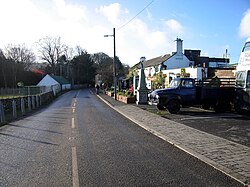Glencullen
Glencullen
Gleann Cuilinn | |
|---|---|
Village | |
 Glencullen with Johnny Fox's pub on the right | |
| Country | Ireland |
| Province | Leinster |
| County | Dún Laoghaire |
| Elevation | 276 m (906 ft) |
| Population (2006)[1] | |
| • Village | 189 |
| • Electoral division | 13,006 |
| Irish Grid Reference | O186206 |

Glencullen (Irish: Gleann Cuilinn, meaning 'valley of the holly') is a village and townland in the county of Dún Laoghaire in south County Dublin, Ireland. It is in the civil parish of Kilternan and the barony and Poor Law Union of Rathdown.
The village is on the R116 road on the slopes of Two Rock Mountain, above the valley of Glencullen (from which it takes its name). Its highest point is at a height of about 300 metres (980 ft),[2] making Glencullen one of the highest villages in Ireland.
Heritage
There is a Bronze Age wedge tomb at Ballyedmonduff on the south eastern slope of Two Rock Mountain. It is known locally as the giants grave. It is a rectangular chamber divided into three parts surrounded by a U shaped double walled kerb filled with stones. The tomb was excavated in the 1940s by Seán P. Ó Riordáin and Ruaidhrí De Valera when cremated bone, a polished stone hammer, flints and pottery were found.
Below Two Rock Mountain is the prominent South Dublin landmark of Three Rock Mountain, complete with its Communications Masts, some of which are visible from Glencullen.
Glencullen also has an important standing stone at Newtown Hill and also has an earthern burial mound dating from the same period as the wedge tomb at Ballyedmonduff.[3]
Entertainment
At the centre of the village is Johnnie Fox's Pub, which was established in 1798, the year of the Irish Rebellion led by Theobald Wolfe Tone. It is claimed to be the highest pub in Ireland – a claim disputed by other pubs in Ireland. It was used by the 1916 Rebellion leaders as a meeting place.[citation needed]
Amenities
The part-time library is housed in a Carnegie building, dating back to 1907.
St. Patrick's National School (a national primary school) is in Glencullen.
Sport
The Stars of Erin(Irish: Réaltaí na hÉireann ) are the local Gaelic Athletic Association club. They were founded in 1903 and have two All Ireland Club titles, and are holders of the Paddy Mulligan Cup.[citation needed]
There is a nine-hole golf course and an 18-hole pitch and putt course.
Transport
The number 44B Dublin Bus service runs from the Dundrum Luas station to Glencullen.[4]
History
Glencullen was home to the politician Christopher Fitzsimon, son-in-law of Daniel O'Connell[5] In August 1841 the village was centre of the agitation movement against Robert Peel's government when the "cabinet council" was convened at Fitzsimon's seat. Attendees included Viscount Morpeth and Frederick Romilly. During the Fenian Insurrection of 1867 the nine policemen of Glencullen barracks surrendered to the Irish Republic.[6]
Glencullen features heavily in Dennis Kennedy's memoirs entitled Square Peg.[7]
See also
References
- ^ "Census 2006 – Volume 1 – Population Classified by Area" (PDF). Central Statistics Office Census 2006 Reports. Central Statistics Office Ireland. April 2007. Archived from the original (PDF) on June 7, 2011. Retrieved 2011-06-22.
{{cite web}}: Unknown parameter|deadurl=ignored (|url-status=suggested) (help) Glencullen environs as a suburb of Dublin included in total. - ^ Ordnance Survey Ireland: Public Map Viewer (centered on Glencullen)
- ^ "History of Glencullen" (PDF). Retrieved 2015-07-13.
- ^ Dublin Bus
- ^ The Times, O'Connell and the People of Leicester, 6 August 1836
- ^ The Times, The Fenian Insurrection 9 March 1867
- ^ Square Peg – Dennis Kennedy

